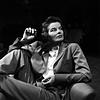Take a photo of a barcode or cover
inspiring
reflective
Flaws of characters a main focus:
Yes
Anne Carson's translation is immediately accessible even for people who are unfamiliar with Greek drama, and the introductions she provides are as well-written and insightful as the plays themselves.
the three tragedians has vastly different imaginings of these characters and the ambiguities of justice. aeschylus gets at the violence of preverbal emotion, sophocles at the righteousness of grief, euripides at an absurdity not unlike king lear. all set in this cursed house that remembers blood long run cold. that demands retribution.
An interesting book; it's striking what a different feeling there is to each play. The language is very modern, which is sometimes jarring, though.
This is Greek tragedy boiled down to its most potent essence: agonizing choices between different visions of justice and the good, played out in the bloodiest possible way and without any hope of escaping inexorable Fate. Of course Carson's translations are impeccable, sharp, and hilarious. Of course there are just enough modern phrasings to impart a zing to the text, along with beautifully fresh compound word neologisms that make the poetry pop.
The choice to combine plays from the Big Three to tell the story of the Atreidae is inspired (although it sounds like the initial idea wasn't Carson's), and you really get a visceral sense of how the approaches of Aiskhylos, Sophokles, and Euripides differ. In Carson's hands, Euripides is full of surreal chaos and black humor. Aiskhylos comes off as philosophically sharp, and Sophokles as enamored with the rebel spirit. Put together, the fertile possibilities of Greek myth seem endlessly mutable and refracting.
The choice to combine plays from the Big Three to tell the story of the Atreidae is inspired (although it sounds like the initial idea wasn't Carson's), and you really get a visceral sense of how the approaches of Aiskhylos, Sophokles, and Euripides differ. In Carson's hands, Euripides is full of surreal chaos and black humor. Aiskhylos comes off as philosophically sharp, and Sophokles as enamored with the rebel spirit. Put together, the fertile possibilities of Greek myth seem endlessly mutable and refracting.
dark
informative
fast-paced
I’ve been meaning to read this for years, and it’s quickly become something I intend to go back to again and again. The usage of language here is incredible, and Carson balances the uncertainty of the characters with the simple diction that we’re used to when we read these plays. (And anyway, how could I not love a work that takes such a strong positive stance towards womanhood and its inherent rage?) I’m so excited to get my hands on more of her work soon!
5 stars for Agamemnon, 4.5 for Elektra, and 2 for Orestes (sorry, Euripides!). I really enjoy this translator's style though, and would read more of her translations.
I hated the movie "Troy". For all the reasons one should hate a movie: awful directing (I know they're good actors, so I blame their lameness on the director, and also:), terrible terrible script, overpowering-to-the-point-of-hyperbole score, unreasonably long running time, and Brad Pitt's ridiculous paycheck. Seriously, I know his abs were magical, but if they could have paid him a few million dollars less, they might have been able to afford a better screenplay, conductor, director, etc.
Yes, for all these reasons, I hated Troy up until the last few minutes of the movie. Then, I hated it for a completely different, and some may say snobby, reason: they freaking kill Agamemnon. The arrow or spear or whatever goes WHOOSH-thud, and my favorite Greek story of all time goes POOF into non-existence. But, you know, Brad Pitt gets his revenge or whatevs I DON'T CARE. They messed up the Oresteia, the House of Atreus, Klytamnestra's revenge, one of the most compelling stories I've ever read in my life, all for Brad Pitt's magical abs. That is simply...unforgivable.
So it's good to see that the Oresteia didn't die after that. I've read Anne Carson's poetry, and her translation of these plays are what I expected. More contemporary poets need to translate ancient works. I loved Heaney's Beowulf, and now Carson's Oresteia. Even if you're unfamiliar with the plays in this book, Carson gives us great introductions before the plays begin. So if you already love the story, I recommend it; if you've read older translations and hated it, I recommend it; and if you have no idea what it's all about, I recommend it.
Yes, for all these reasons, I hated Troy up until the last few minutes of the movie. Then, I hated it for a completely different, and some may say snobby, reason: they freaking kill Agamemnon. The arrow or spear or whatever goes WHOOSH-thud, and my favorite Greek story of all time goes POOF into non-existence. But, you know, Brad Pitt gets his revenge or whatevs I DON'T CARE. They messed up the Oresteia, the House of Atreus, Klytamnestra's revenge, one of the most compelling stories I've ever read in my life, all for Brad Pitt's magical abs. That is simply...unforgivable.
So it's good to see that the Oresteia didn't die after that. I've read Anne Carson's poetry, and her translation of these plays are what I expected. More contemporary poets need to translate ancient works. I loved Heaney's Beowulf, and now Carson's Oresteia. Even if you're unfamiliar with the plays in this book, Carson gives us great introductions before the plays begin. So if you already love the story, I recommend it; if you've read older translations and hated it, I recommend it; and if you have no idea what it's all about, I recommend it.
Carson’s translation of Kassandra’s lines in Agamemnon is possibly the most heart-breaking, beautiful thing I’ve ever read

